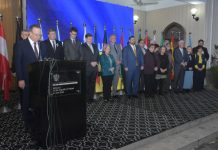There is an extraordinary, deep anxiety prevailing right now in Gaza because the question everybody asks is whether, yes or no, there would be a military offensive,” UNRWA Commissioner-General Philippe Lazzarini told
UITED NATIONS, May 01 (APP):Ordinary Gazans remain in a “constant state of trauma” over an impending full-scale Israeli attack on the enclave’s southernmost city of Rafah amid a growing number of strikes there, according to the head of the UN agency for Palestinian refugees.
“There is an extraordinary, deep anxiety prevailing right now in Gaza because the question everybody asks is whether, yes or no, there would be a military offensive,” UNRWA Commissioner-General Philippe Lazzarini told reporters in Geneva on Tuesday.
Following several reports by the UN aid coordination office, OCHA, of “intensive strikes on Rafah” that caused dozens of fatalities, Lazzarini said a full-scale invasion of Rafah – currently home to around one million displaced Gazans – depended on “whether or not a ceasefire deal will be reached this week”.
Despite renewed international pressure for a humanitarian pause, including from the United States, no breakthrough in negotiations has yet been announced.
In the meantime, Gaza’s hunger crisis has not gone away, the UNRWA chief said, pointing to “a spreading hunger and a looming famine”, especially in the northern part of the enclave.
“The good news is that my colleagues have reported that there is more food available in the market – so increase the availability – but it still does not mean that the food is accessible just because there is absolutely no cash circulating in the northern part of the Gaza Strip.”
Echoing concerns in a regular update on the crisis, OCHA noted that the situation remains dire in Rafah, where residents “face severe challenges in accessing basic services such as healthcare, clean water and sanitation facilities”.
The UN aid coordination office added that the coastal water board had warned that the entire water and sanitation system was “nearing collapse”.
To address the rising need for safe drinking water, the Gazan utility and the UN Children’s Fund (UNICEF) unveiled a solar-operated water desalination station in Rafah last week. It can produce enough potable water for 400 families at a school sheltering displaced people.
To help meet still-desperate nutrition needs, UNICEF and more than a dozen humanitarian partners have also expanded outpatient treatment services for acutely malnourished children to more than 100 sites across Gaza, including more than 50 in Rafah and three dozen in the north.
In a glimmer of good news, Lazzarini said that more humanitarian supplies have entered the enclave in past weeks than in previous months, but it is “still far from enough to reverse the negative trend we have seen”.
UNRWA’s requests to send aid convoys continue to be “systematically denied” by Israel, he continued, adding that the laborious process of having to unload and reload supplies to allow for inspection increased delays that were already impacted by operating hours of the crossing into Gaza that vary “from one day to another”.
The crossing into Gaza could also be closed at a moment’s notice and “many times a week” by the Israeli authorities, the UN official said, “because they are just dumping released detainees or dumping sometimes (Palestinians’) bodies who have been taken to Israel and back to the Gaza Strip”.

















